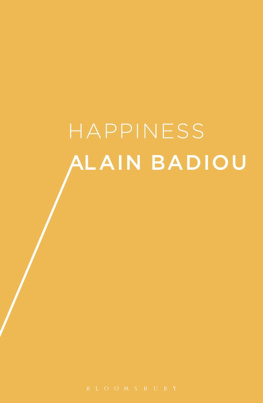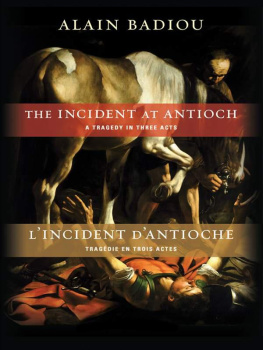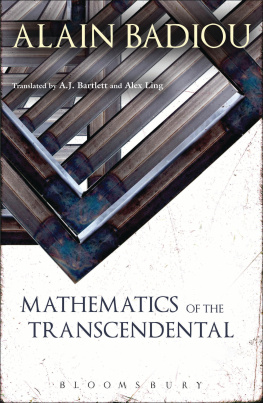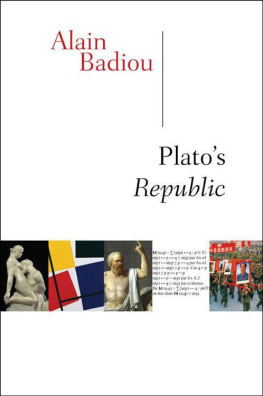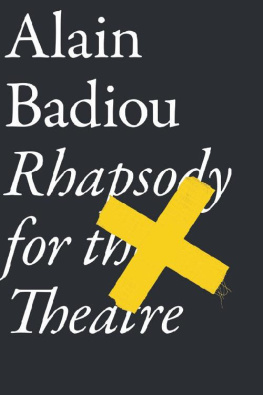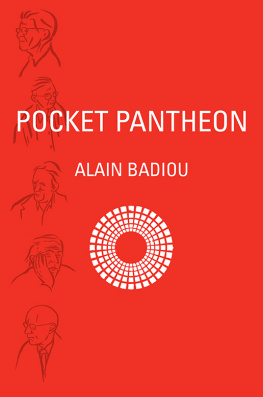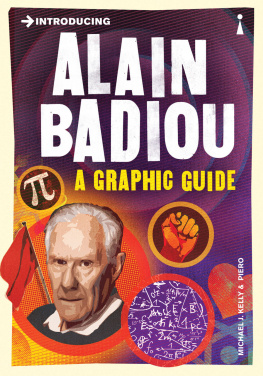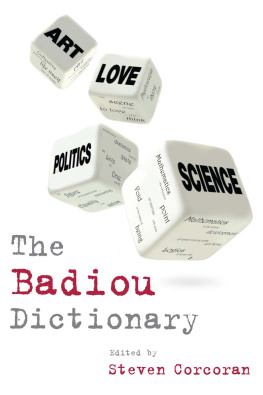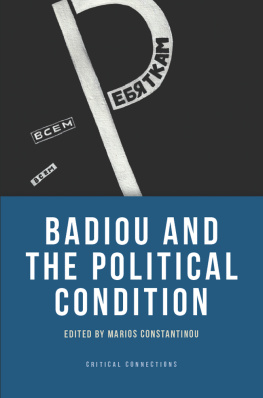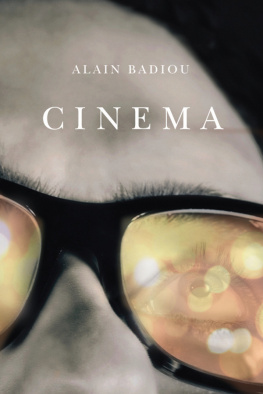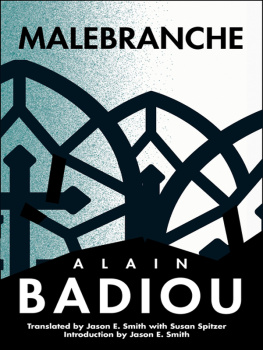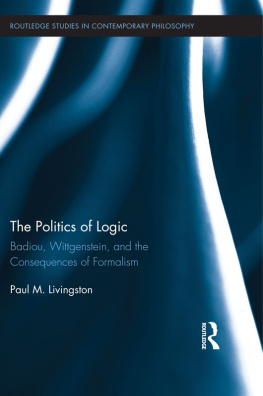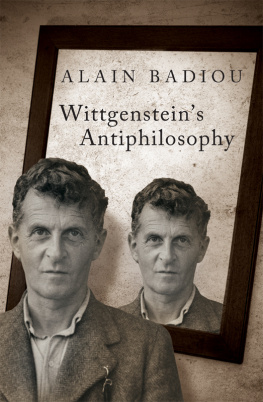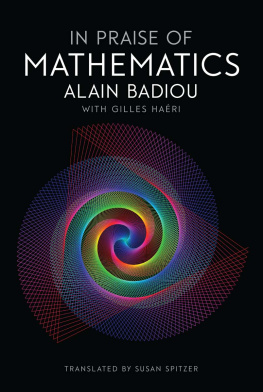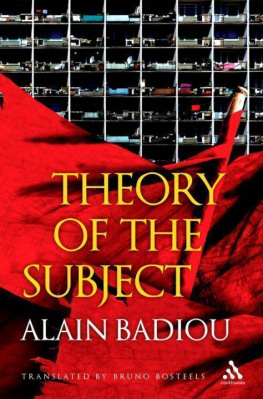Alain Badiou - Happiness
Here you can read online Alain Badiou - Happiness full text of the book (entire story) in english for free. Download pdf and epub, get meaning, cover and reviews about this ebook. year: 2019, publisher: Bloomsbury Publishing, genre: Religion. Description of the work, (preface) as well as reviews are available. Best literature library LitArk.com created for fans of good reading and offers a wide selection of genres:
Romance novel
Science fiction
Adventure
Detective
Science
History
Home and family
Prose
Art
Politics
Computer
Non-fiction
Religion
Business
Children
Humor
Choose a favorite category and find really read worthwhile books. Enjoy immersion in the world of imagination, feel the emotions of the characters or learn something new for yourself, make an fascinating discovery.
- Book:Happiness
- Author:
- Publisher:Bloomsbury Publishing
- Genre:
- Year:2019
- Rating:5 / 5
- Favourites:Add to favourites
- Your mark:
- 100
- 1
- 2
- 3
- 4
- 5
Happiness: summary, description and annotation
We offer to read an annotation, description, summary or preface (depends on what the author of the book "Happiness" wrote himself). If you haven't found the necessary information about the book — write in the comments, we will try to find it.
Happiness — read online for free the complete book (whole text) full work
Below is the text of the book, divided by pages. System saving the place of the last page read, allows you to conveniently read the book "Happiness" online for free, without having to search again every time where you left off. Put a bookmark, and you can go to the page where you finished reading at any time.
Font size:
Interval:
Bookmark:

Happiness
ALSO AVAILABLE FROM BLOOMSBURY
Being and Event, Alain Badiou
Conditions, Alain Badiou
Infinite Thought, Alain Badiou
Logics of Worlds, Alain Badiou
Theoretical Writings, Alain Badiou
Theory of the Subject, Alain Badiou
Anti-Oedipus, Gilles Deleuze
Thousand Plateaus, Gilles Deleuze and Flix Guattari
Molecular Revolution, Flix Guattari
Schizoanalytic Cartographies, Flix Guattari
The Three Ecologies, Flix Guattari
Seeing the Invisible, Michel Henry
After Finitude, Quentin Meillassoux
Time for Revolution, Antonio Negri
Althussers Lesson, Jacques Rancire
Chronicles of Consensual Times, Jacques Rancire
Mallarm, Jacques Rancire
Politics of Aesthetics, Jacques Rancire
The Five Senses, Michel Serres
Rome, Michel Serres
Statues, Michel Serres
Art and Fear, Paul Virilio
Negative Horizon, Paul Virilio

BLOOMSBURY ACADEMIC
Bloomsbury Publishing Plc
50 Bedford Square, London, WC1B 3DP, UK
1385 Broadway, New York, NY 10018, USA
BLOOMSBURY, BLOOMSBURY ACADEMIC and the Diana logo are trademarks of Bloomsbury Publishing Plc
First published in French as Mtaphysique du bonheur reel, Presses Universitaires de France, Alain Badiou 2015
English translation Bloomsbury Publishing Plc, 2019
Alain Badiou has asserted his right under the Copyright, Designs and Patents Act, 1988, to be identified as Author of this work.
For legal purposes the Acknowledgements on constitute an extension of this copyright page.
Cover design by Catherine Wood
All rights reserved. No part of this publication may be reproduced or transmitted in any form or by any means, electronic or mechanical, including photocopying, recording, or any information storage or retrieval system, without prior permission in writing from the publishers.
No responsibility for loss caused to any individual or organization acting on or refraining from action as a result of the material in this publication can be accepted by Bloomsbury or the author.
A catalogue record for this book is available from the British Library.
ISBN: HB: 9781-47427552-1
PB: 9781-47427553-8
ePDF: 9781-47427554-5
eBook: 9781-47427555-2
A catalog record for this book is available from the Library of Congress.
To find out more about our authors and books visit www.bloomsbury.com and sign up for our newsletters.

Contents
by A. J. Bartlett and Justin Clemens

A side from Alain Badiou himself, the translators would also like to thank Robert Boncado, Bryan Cooke, Lia Hills, Helen Johnson, Isabelle Vodoz and Angela Cullip for their indispensable aid with the preparation of this translation.

A lain Badious Mtaphysique du bonheur rel was first published in the series Mtaphysique S, edited by lie During, Patrice Maniglier, Quentin Meillassoux and David Rabouin for Presses Universitaires de France in 2015. This translation of which more in the translators Introduction was done over the course of 2015. Happiness, the books current English title, a radical truncation of the full title Metaphysics of Real Happiness, was mandated by publishing concerns. Reasons for Badious original choice of title are discussed in the Introductions below.
A.J. Bartlett and Justin Clemens
A matter of form
The last thing that the work of Alain Badiou can be said to be lacking is the means to speak in its own terms or, as he insists, in its own name. The present text is no exception. As has often been said, Badiou is his own best exegete. So why another introduction? Despite the threat of superfluity, the demand for further exegesis is built into what Badiou conceptualises. The invention of concepts is for Badiou always also an invention of a new form, both the form of its possible consistency and the means of its transmission, in the manner aspired to by the French psychoanalyst Jacques Lacan of integral transmission. In Being and Event, the formal means by which being is inscribed is paramount; in Logics of Worlds, that by which being appears is renovated; and, in the forthcoming Immanence of Truths, the question concerns the specificity of a truth in the form of a truth itself. Surely Happiness too deserves a short detour through the means, which is to say the metaphysics, of its real form.
In Badious three big books mathematical formalisation set theory, category theory, and paraconsistent logic is presented as integral to thought, as what can be thought. Here we encounter the thought of what there is, of what it is possible for thought to think of what there is, and the form by which what there is can come to be. Built into this mathematical formalisation is the injunction to think that which is not being qua being and whose existence is in exception to both being as such and the law of a world. The mathematical condition, as Badiou philosophically explains it, is the form of being and of being appearing that can be thought which includes within its exposition consistent with it, integral to it the very possibility of that which it is not. For Badiou, the task of a philosophy dedicated to the event is to think this as exception, whose site ontology provides, as philosophy, to invent philosophy under the formal conditions of its time. Set theory, for Badiou, writes being. Its writing is beings formalisation. Logic, the greater logic of category theory, writes being there. What it is for what is thus elemental being is to be or exist with others. Category theory is, for philosophy, an immanent theory of being with others, of relations, purely and simply. In the imminent third book, Immanence of Truths, the new formalism introduced on a large scale is paraconsistent negation, which explicitly contradicts the principle of non-contradiction. This formalism allows, when considering a truth, for contradictory perceptions to co-exist without interrupting the unity of this truth. Three forms, three concepts: the generic, association, interiority.
What is most profoundly at stake, what concerns the fundamental turning of the world upside down, to paraphrase Callicles accusation against Socrates a turning that makes us all decidedly anxious, the great dissembler warns is that the onto-logy of Badious texts is fundamentally new. It is a new and newly possible treatment of an integral and insistent philosophical treatment. What set theory formalises, what category theory and paraconsistency formalise in turn which is to say, what insists as true of these forms of thought is that the One is not. Fundamentally, Georg Cantors discovery of denumerable and uncountable infinites or the impossibility of the infinite being One and thus the conceptual impossibility of it being marked as the place of some One, God, Nature or History (or Market) and thereby operative as potential or virtual or ineffable, means that philosophy, under such a condition, must be the rethinking of all that pertains to it from the point of view of this actual infinite. If the One is not, everything and every relation must be rethought. Badious classical philosophical categories of being, appearing, truth, subject, which he maintains against the temper of the times, which sees in ineffable multiplicity their final and finite deposition, are essentially new words in philosophy. Badious deployment of them is not a return to classicism, but the means of an entirely new formalisation of what these names present to thought. Philosophy, which is always
Font size:
Interval:
Bookmark:
Similar books «Happiness»
Look at similar books to Happiness. We have selected literature similar in name and meaning in the hope of providing readers with more options to find new, interesting, not yet read works.
Discussion, reviews of the book Happiness and just readers' own opinions. Leave your comments, write what you think about the work, its meaning or the main characters. Specify what exactly you liked and what you didn't like, and why you think so.

